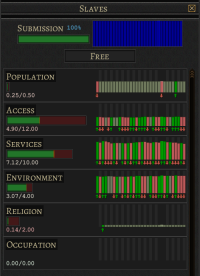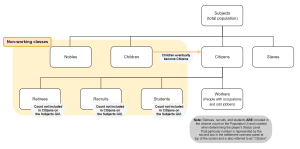Subjects
This page is being created after receiving clarification on the definition of subjects and citizens from Jake, the developer. A diagram was approved for accuracy and will be added to this page. Additionally, reducing the total amount of pages required for defining all of the game's entities would be nice. For example, merging the short Slaves page into this one would make sense.
These items are all related to the reorganization of subjects and citizens information and may not all occur on this page directly:
Subjects are all of the people that make up your settlement. Subjects may be comprised of eight unique races: Amevias, Argonosh, Cantors, Cretonians, Dondorians, Garthimis, Humans, and Tilapis. Argonosh and Cantors are not available as selections when starting a new game.
A settlement's population is made of several classes of subjects: nobles, citizens, children, and slaves. Children eventually grow up and become Citizens. Citizens are further divided into four more classes: Retirees, Recruits, Students, and Workers. The only classes that will have an occupation or perform work tasks are worker citizens and slaves. However, the other classes, while not working, do have activities they perform throughout the day.
Races
 Cretonians
Cretonians
- Main article: Cretonians
Cretonians are the most peaceful race, and excel at farming rather than more grueling work such as mining. They prefer warmer climates and areas with bodies of water. They are comfortable around all of the other races. Cretonians prefer to practice the religion of Cratorism. They are vegetarians and prefer wooden structures.
 Dondorians
Dondorians
- Main article: Dondorians
Dondorians are fundamentally the opposite of Cretonians, as they are adept at fighting and excel at refinery work and mining. They enjoy colder climates and living under mountains. Dondurians dislike Tilapis and strongly dislike Garthimis. The majority of Dondurians prefer to practice the religion of Athurism. They prefer eating bread, fish, and mushrooms.
 Garthimis
Garthimis
- Main article: Garthimis
GGarthimis are humanoid-insect hybrids and can produce offspring the fastest of all the races. They are highly skilled fishers and miners. They do not care for the finer things in life, and do not take life nor death very seriously, making them excellent cannon fodder. They enjoy living in warmer climates and, like Dondurians, within mountains. However, they dislike Dondurians. They mostly enjoy practicing the religion of Aminionism, though some prefer Shmalorism. They prefer eating meat and fish.
 Humans
Humans
- Main article: Humans
HHumans are the most mentally flexible and free-willed of all the races. They skilled farmers and excel as seekers of knowledge and administrators. They also have the ability to withstand any type of climate and enjoy open land. They are comfortable with all of the other races. Humans practice all religions, but prefer Athurism and Cratorism. The foods they prefer are bread, meat, mushrooms, and eggs. They desire to live in settlements constructed of the finest cut stone.
 Amevias
Amevias
- Main article: AmeviasAmevias are an aquatic race, favoring water and shorelines in warmer climates. They are excellent at fishing and the herding of Globdien. They are extremely intolerant of Cretonians, Dondorians and Humans. Amevias have an appreciation for all religions, except Shmalorism. They prefer a diet of fish, fruit, and eggs. Amevias enjoy living in settlements constructed of the finest cut stone, but also find plain stone buildings to be acceptable.
 Tilapis
Tilapis
- Main article: Tilapis
TTilapis are deeply passionate about the plant life and wildlife in the world, making them excellent animal herders and tree farmers. Additionally, they excel at the production of bows. They are tolerant of all climates, but prefer living near forests. They dislike Dondurians and Garthimis. Tilapies strongly favor the Cratorism religion. They prefer a diet of meat, fruit, and eggs. They thrive in the outdoors and prefer structures made from wood.
 Argonosh
Argonosh
- Main article: Argonosh
Argonosh are likely to be the oldest type of race in the game. They excel at being fast and doing serious damage in combat, but despise doing any real work. However, when it comes to crime or punishment, they do favor those related duties. They strongly dislike Dondurians and Tilapis. As children of Shmalor, the Argonosh solely practice Shmalorism. They prefer eating meat, fish, and eggs. Argonosh prefer living in mountains, but will tolerate structures made of stone. They are not available to select as a race when starting a new game and do not immigrate.
 Cantors
Cantors
- Main article: Cantors
CCantors are the rarest and one of the most unique of the races. Cantors are giants that are hard to recruit to your settlement and are hard to please. Cantors excel at mining, refinement and crafting, but are particularly bad farmers and herders. Cantors despise Garthimis and Humans. They solely practice the Athurism religion. Cantors enjoy a diet of eggs, meat, and fish. They prefer settlements constructed of the finest cut stone. They are not available to select as a race when starting a new game and do not immigrate.
Classes of Subjects
 Nobles
Nobles
- Main article: Nobles
Nobles are high-ranking subjects, appointed by the player, that oversee certain aspects of resource production. Doing so provides a flat bonus to the industry's performance and may also provide other bonuses.
 Citizens
Citizens
- Main article: Citizens
Citizens are the very lifeblood and backbone of a settlement. With the guide of the player, they are responsible for keeping the settlement running and growing stronger, including the gathering and production of resources and the bolstering of the army.
 Children
Children
Children are the result of procreation in your settlement. They are considered a non-working class of subject that are not yet citizens. Children of each species takes different amounts of time to reach adulthood. During that time they will consume food, and spend their days running and playing around the settlement. If a school is built and there are places available, children will attend class to receive an education, allowing them to gain bonuses to various skills for use when they reach adulthood and begin working. Once fully grown into adults, they will become citizens, thus allowing them to find an occupation, attend to tasks as an odd jobber, become university students, become army recruits, or even be appointed by the player to nobility. Also, it is at this point that they are counted in the total number of citizens and can help you increase your status level.
 Slaves
Slaves

Slaves behave similarly to citizens, but with much less freedom and are dependent on submission to keep them in line and continuously working for the player's settlement. If the slaves are not submissive enough, they may run away. Slaves can be obtained in one of three ways. Those who have committed a crime may be condemned to become a slave if a judge demands so. Defeated enemies can also become enslaved, as well as citizens living in a settlement that you have conquered. More specifically, when the player conquers a settlement, they can choose to show mercy, ransack the conquered settlement or completely annihilate it. The last two options allow the player to choose how many citizens will be enslaved. Choosing to annihilate the settlement will allow a higher number of citizens to be enslaved, but leaves the conquered settlement reduced to nothing.

Slaves do not count toward the number of citizens living in a settlement, so buying more slaves does not bring the player's settlement closer to leveling up. Only citizens count towards leveling. Slaves, like normal citizens, also have needs that need to be fulfilled to keep them submissive. Different races have different requirements for being satisfied and staying submissive.
The player can free all of their slaves at any time. In doing so, they become citizens of the settlement.
Understanding Subjects Composition

All people in the settlement are subjects. Subjects are made of four classes: Nobles, Citizens, Children and Slaves. Children eventually grow into Citizens. Citizens are made up of four classes. Of those, three are non-working classes: Retirees, Recruits and Students. The final Citizens class is the working class.
Clicking the first box in the overview panel at the top left of your screen will open the Subjects GUI. Adding all of these classes together will yield the total subjects in your settlement.
The way Citizens are counted towards different totals is done different in all three places that these numbers are displayed: the Subjects GUI, the Population GUI, and the Status Level GUI. Effectively, the term Citizens is used interchangeably for "All Citizens", "Only Working Citizens", and "All of the Citizens in all of the Settlements Controlled By the Player". This is explained in greater detail on the Citizens page.